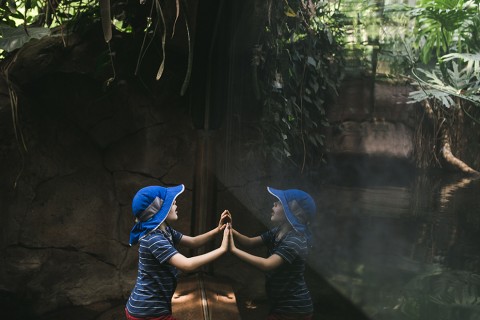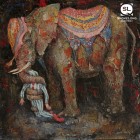Mama loves the sea jellies best.
“See the way the bell goes blub blub?” she says to Robby, pointing to the opaque body of one of the moon jellies. “They pull the water in and push it out, just like pumping blood. Water is their blood. It’s how jellies get oxygen and other nutrients.”
Mama talks to Robby like he understands.
“Our hearts would make graceful swimmers too,” she says. “Pluck them from our bodies and set them free in the ocean, and they’d move with the water rather than cut through it the way fish do.”
A worried pout crumples Robby’s face. He claws at the waistband of Mama’s skirt, nearly undressing her. When she pries his fingers away, he pinches the soft flesh above her elbow and kisses it. He bends and kisses her knees, then wraps himself around one of her calves. He’s seven. Mama says this phase will pass, but she’s been saying that since he was born.
If Mama’s heart is the bell of a sea jelly, then Robby’s is the tentacles.
Mama and Robby aren’t a moon jelly with its sleek bell and delicate tentacles like fringe bangs. They’re a lion’s mane jelly, the largest sea jelly known to humans. The bell can grow seven feet wide, the tentacles 120 feet long. The plaque beside the tank shows a photograph of an adult: it looks like a disembodied breast, trailing wild, stringy milk ducts.
Sometimes Mama tells Robby to give her space, but other times, like now, she rubs the back of his head and smiles bittersweet, like maybe it’s not all bad being clung to. Or maybe she’s remembering how when Robby was a baby, nothing calmed him as much as her depositing him onto Dad’s bare chest, like into a nest. He’d curl his tiny, red fingers around those wooly hairs, and his face would soften into a cool pink.
Eight months ago, not quite ten months after Dad died in Iraq, Mama started dating. She shoos us out of the house when one of them calls. She says, so she can hear, but I think it’s so she can chalk up Robby’s moaning and hollering to the neighbors, street noise.
Years ago, after Aunt Laura’s divorce, Mama told her not to worry about dating with two kids: “You have two beautiful little girls. They’re assets, not deficits.” Greta and Bea were five and four then and had shiny black hair and olive skin and singing voices so sweet, strangers cried during their duets at school recitals.
I never was pretty like my cousins. Puberty hasn’t helped. Mama jokes that my skin and hair are so oily, I better steer clear of flames or I’ll ignite. Then she says not to worry, she went through the same thing. It’s a phase. It’ll pass.
But some mornings, she winces at me like she does at the bathroom mirror when she’s tweezing gray hairs. She says, “Thirteen, thirteen. How can I be old enough to be the mother of a thirteen-year-old?”
Before Dad died, I was just Ann—not a teenager, not a deficit. I guess you could say Robby has always been a deficit, but Mama wouldn’t say that aloud, not even now.
I know Mama has lost another man, because we don’t come to the aquarium on good days: when she stays out until one in the morning, then wakes up early to make chocolate chip pancakes. A few days ago, she bought a brand new dress, red, for dancing in, she said. But the dress’s only action last night was the breeze from the ceiling fan while we ate Frito pie and watched an old Julia Roberts movie, Mama bouncing Robby on her lap to keep him quiet.
Mama says she doesn’t want to date, that dating is, in fact, the last thing she wants to do, but if she doesn’t look for a man now, when? She’s not getting any younger, she says.
She makes dating sound like buying a new blender, which she did a few months ago. The broken blender had been a wedding gift. She had it fourteen years. “I’d give anything to have it restored, but nobody seems to know how to fix anything anymore. Me included. And what am I going to do? I have to have a blender,” she said. The blenders in the store all had plastic pitchers, even the expensive ones. “I don’t want plastic. It stains. It smells,” Mama said, but after visiting three different stores, and finding only one brand that made glass pitchers and their price tags being nearly three times that of the plastic pitcher models, she gave in and bought plastic.
Mama doesn’t say, if only… But it’s us she’s thinking of when she says that her heart would swim as gracefully as a sea jelly if it were set free.
I know because now Robby is howling and punching the moon jelly tank, and Mama has to remove him from the glass like he’s suctioned to it. She has to take him outside to the bench across from the huge wooden shark’s mouth. Kids enter through a black curtain around back to pose for photos, their faces lodged between the shark’s teeth like bits of food debris. Mama rocks Robby while other mothers watch out of the corners of their eyes, while they whisper to their kids in harsh voices not to poke the glass.
I know because while Mama rocks Robby, I remain where I am, in front of the Bay pipefish tank. The plaque says the slender pipefish have to anchor themselves to the eelgrasses because they’re poor swimmers. They’d perish in the open coastal waters. Still, I admire how they blend in effortlessly. You have to lean in close to pick them out. It’s the eyes like tiny gold washers set in tar that give them away.

Notes from Guest Reader Kathleen Founds
Intriguing dialogue, beautiful underwater imagery, and a strong emotional core drew me into the story of love, loss, and jellyfish.


 The core workshop of SmokeLong Fitness is all in writing, so you can take part from anywhere at anytime. We are excited about creating a supportive, consistent and structured environment for flash writers to work on their craft in a community. We are thrilled and proud to say that our workshop participants have won, placed, or been listed in every major flash competition. Community works.
The core workshop of SmokeLong Fitness is all in writing, so you can take part from anywhere at anytime. We are excited about creating a supportive, consistent and structured environment for flash writers to work on their craft in a community. We are thrilled and proud to say that our workshop participants have won, placed, or been listed in every major flash competition. Community works.